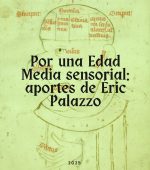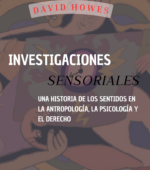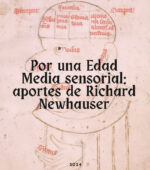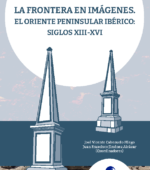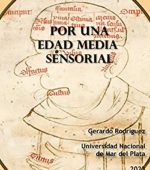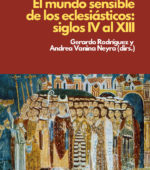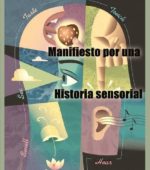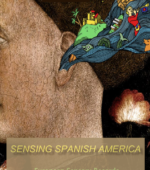ACTIVITIES AND NEWS GIEM 2025
Number 38 of Medieval Notebooks
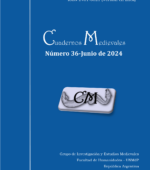 Please note that the corresponding number already finds available June Medieval Notebooks, Magazine Group Research and Medieval Studies. As always thank those who have helped to get out on time, and the same hope will be of interest to readers and potential future authors.
Please note that the corresponding number already finds available June Medieval Notebooks, Magazine Group Research and Medieval Studies. As always thank those who have helped to get out on time, and the same hope will be of interest to readers and potential future authors.
Also, we remind you that our magazine is indexed and repositories Core of scientific journals of Argentina, Latindex (Directory and Catalog 2.0), DOAJ, Google Academics, Dialnet Plus, RedIB, ERIHPLUS, MEASUREMENT, ROAD y Scopus.
Rehend for me, I pray for you, Rehend for him: Francisco, The Pope Argento
Gerardo Rodriguez
National Council of Scientific and Technical Research, Department of History of the Faculty of Humanities of the National University of Mar del Plata and National Academy of History - Argentine Republic gefarodriguez@gmail.com
Pope Francis left us early in the morning, on Monday 21 April 2025. The official Vatican statement tells us that he has left for the father's house, I actually believe that he died without dying… He had been elected Wednesday night 13 March 2013, day the cross hugged again…
Of the two news I found out on television; The two caused me a deep surprise, But accompanied by opposite emotions, the indomitable joy for having his Argentine holiness and, now, The sadness for his departure not expected in these Easter. Then I hugged the pain to remember it.
The first time I jumped very happy in a faculty bar, along with those that circumstantially meet. In my case, I was about to go to classes, The first of the four -month period, of Medieval General Universal History, And the news filled the hours, Since as medievalist I had a lot to reflect on the implications of the vote by Jorge Mario Bergoglio, His coronation as Pope and the choice of the name Francisco del Pope Argentino. Above all that this meant as a paradigm change: A man from neighborhood, With deep commitments with the humble and marginalized, A pastor more than a theologian, that arrived with a very original order, Since Brazil, To all believers but especially the youngest - do noise to bring the gospel to every corner of the world -, as a way to face the status quo of the Church in particular but of society in general.
The second time I cried silently and in the solitude of my house. I was reprogramming the first part of the same matter, that with fair union activity it has been altered. This time I thought about the need to assess the legacy of his twelve years of pontificate and remember how Francisco, The Pope Argento, More than Argentine, for his bonhomy that, While it was universal, embodied in the gestures of his face when receiving the different world leaders (His wide smile or his austere seriousness), His deep Buenos Aires humor (When a journalist asked him what he was, In allusion to international policy issues, He replied that in a wheelchair), His political commitment for democracy (When they reminded him that right -wing leaders are democratic as soon as they won elections, He reminded them of Hitler's origin and his candid initial consideration as an adolfito), Your option for the poor (that always reminded him of his option for the priests villeros of Buenos Aires), His passion for football (He prayed with Maradona and the parishioners of the Maradonian Church or thanked for some triumph of San Lorenzo, Your Boedo Club), Your choice for infusions (The mate), The sweets (alfajores with dulce de leche) or the parts of their clothes outside the papal luxury (His black spent shoes and his ajado briefcase).
And I remembered his insistent request for praying for me, that sounded in my collective unconscious as I pray for you, Rehend for him. His plea could be interpreted in multiple ways, I prefer to underline the humility and power that implies the request for prayer of those who left everything for this loneliness, even its own land, to which he could never return.
We were the Pope of the poor, of the hungry, of the crazy people, Of those who left and those who are in prison.
To be one hundred percent Argento he lacked being a bostero. But everything cannot be in this life…
When writing these lines I had two musical themes in my emotions and senses: "Collective unconscious", Song composed by Charly Garcia, which is part of your album Angelic Pubis / Going from bed to the living room (1982) And "I pray for you", Composed by Charly García and Luis Alberto Spinetta and the only record that remained of the truncated project called Spinetta/Garcia. The issue was released for the public for the first time in 1985, In a joint execution of Spinetta and García and engraved by Spinetta on their album Private (1986) And by Garcia in his album Part of religion (1987).
Owl. THE NETWORK OF LAS LOS
Federico Asiss González (National University of San Juan)
Pedro Becchi (National University of Mar del Plata)
Javier CHIMONDEGUY (National University of Mar del Plata and National University of the Center of the Province of Buenos Aires)
Lydia Raquel MIRANDA (National University of La Pampa and Conicet)
Gerardo Rodriguez (National University of Mar del Plata, CONICET and National Academy of History)
Nilda Guglielmi, Conicet Superior Researcher, ANH academic, Professor at the Faculty of Philosophy and Letters of the UBA, medievalist of international prestige, She was director of the Working Group Europ América, from the ANH and the research group and medieval studies (pendent) of the Interdisciplinary Center for European Studies (CIEsE) of the Faculty of Humanities of the National University of Mar del Plata until its death in the middle of 2024.
Nilda was a Fuste researcher and a teacher with extraordinary oratory qualities. Trained as a professor in letters by the University of Buenos Aires, He did his doctoral studies, both in Argentina and in France, In the historic field. His initial works, related to the history of Spain and under the direction of Claudio Sánchez Albornoz, They had an institutionalist court imprint, perspective that complemented with its inquiries about the social and cultural field, guided by José Luis Romero and Georges Duby. It is this link with French historiography that distinguishes it as the great diffuser of the history of mentalities in our country.
Debated on the structures of medieval society, particularly on the ordering of feudal society and bourgeois society, avoiding transitional discussions, And about the history of women, anticipating discussions around gender. A very particular facet of his wisdom was the knowledge of the work of Jorge Luis Borges. His familiarity with the production of the Argentine writer allowed him to understand his influence in Umberto Eco.
Hispanic themes were giving way to those of the history of France and Italy, which led to becoming a reference of the historiographic debates related to the links of history and literature - in particular the importance of literary sources for the reconstruction of the societies of the full and low middle ages -, With the configuration of marginalized groups - in which he included travelers from peasants, crusaders, Girls, single, Widows and old people–, with the possibilities of the reconstruction of everyday life - of the accommodated sectors and the most humble groups -, with disputes around the body and food - especially mystical ones -, With discussions around the political in Italian cities, from the center and north, between the thirteenth and fifteenth centuries - both at the discursive level as of the practice itself -.
Your readings about mentalities, imaginary and political discourse can be pointed out as precursors of current sensory inquiries. With the objective of relating their studies on political discourse with our inquiries about the senses, Gerardo Rodríguez was writing with her the communication "how a man must tame his language", Based on albertano fragments da Brescia, Author that in the thirteenth century explains why speaking and silence constitutes a true art, eminently human technique and aesthetics that configure the social body, political and sensitive of every moment in history, that is to say, political communities, emotional and sensory.
She was also interested in the mechanisms and ways in which people, Social groups and institutions spread ideas, They discussed and reappropriate at different times and places. That is why he paid special attention to the various documentary sources that account for this phenomenon, sources that resorted to the word as a form of dialogue, of encounter but also of tension and colonial domain. In this sense, investigated the presence of religious groups in Asia and America, resorting to travelers' letters, The stories of the Crusaders, To the chronicles of the Indies and the catechesis to understand how medieval Europe expanded beyond its territorial and spatial borders. Partly for this reason, collect Europe's imprint beyond its physical limits, The group that participated in the Academy is named Europ América.
Their appreciations about the importance of medieval times and the need to spread them opened the doors to the writing of scientific and journalistic dissemination and their columns knew how to win a prominent space in the newspapers of Argentina. In their writing both content and form were relevant, since it was important to investigate but also disseminate, as reflected in the medieval university tradition and, also, Currently of French historiography. Hence, in Mar del Plata the group that founded is called Research Group and Medieval Studies (pendent).
His strong defense of the scientificity of the field of medieval history and the relevance of his investigations earned him recognition in the various institutional fields in which he acted: The University, CONICET and the National Academy of History.
Throughout his academic life, Nilda started analysis perspectives, He led to research groups, protected his disciples, among which Gerardo Rodríguez is recognized. As a teacher, he always worried that they knew the documentation thoroughly, Historiographic disputes, debates about social sciences and humanities, The good writing of history.
That is why his departure is still so painful, because they are years of work together, of shared readings, of ambitious and great companionship projects. Your legacy, relevant, It will accompany us, It will not end, It will not be diluted in the dust of oblivion. On the contrary, Like the one of any significant figure, Her human and academic footprint will remain printed on those who met her and benefit from her proximity, In research to come, In the next publications and trajectories of young people who continue to choose history and humanistic disciplines to train and work.
Because like every good inheritance, What Nilda has left us has to do with the past, But above all it has to do with the future.
But that inheritance is not just intangible, It is also material. We want to share with you the good news that one of us (Gerardo) He has inherited his library. This library was organized according to Nilda's own intellectual evolution. And it seemed that everything covered and included. But, Unlike echo, His was not a maze. I had everything ordered, clean… The shelves with just some ornament that evoked the Middle Ages, Some medieval memory, An entrance to an exhibition (Caravaggio was from his favorites), almost never a photograph. While Nilda liked personal memories, those were protected somewhere less public… Was formed at a time when private life and, especially, Emotions and sensibilities were not exhibited, They were a sign of weakness, that left us almost naked in front of the others.
After a few months of hard work, A part of this fund will be integrated into the medieval research and studies group (pendent), especially those works and sources linked to sensory and Italian issues, that will be protected by Gerardo Rodríguez, Javier Chimondeguy y Pedro Becchi; The issues of religiosity and women will be preserved by Raquel Miranda and the sources and studies related to the history of Spain will be in the hands of Federico Asiss-González. The rest, We will offer it in successive almons so that your books find new readers.
His different exlibris had a constant: The image of a owl. The owls, Never the owls, They populated their desk, In figures of different sizes and styles (Girls and medium, Never big, of ceramics, stone, of metal, of strident or white colors such as paper). I also had signaling, Pisapapeles, letterhead leaves and tiny that served as small brooches that stood out from a book, To indicate the importance of what is written and saved there.
Because Nilda kept her books, writings and papers as treasures in a chest. They all had their signature, The place of obtaining, The dedication of the most distinguished historians and historians, The annotations of the main themes of each of them, Spanish translation lists, Indications for what work was using them. She referred to Gerardo as "Pepe Papers", But in reality that nickname felt perfectly.
From that image and that symbolism we have taken the name for this network: owl, THE LEVEL OF WISDOM, of writing, of thought, of reading, of training, of research and pleasure in history and literature. Nilda's owl will continue to open our eyes to culture, and with ours all and all, which will also be beneficiaries of your legacy. We aspire to be owls that illuminate, at least a little, The dark times.
Farewell to Nilda Guglielmi
Today I have to write a few words to say goodbye and thank Nilda Guglielmi, who died last 30 July 2024 to the 96 years. Of that long and fruitful life, As a distinguished researcher of the Middle Ages, she was a generous supporter of several academic teams., among whom we find ourselves. We walked together for more than thirty years, mainly in the GIEM (Medieval Research and Study Group) Faculty of Humanities at the National University of Mar del Plata, of which she was founder and director and which has been and is my academic home. Nilda maintained the direction of the group until the end, since he continued working after his retirement and we were ready to publish, together, a work that combined his Italian themes and my sensitive ones.
My memory of her today will not speak of solemnities or titles or merits., I had them and many. My memory is crossed by the sadness of his departure but, fundamentally and paradoxically, for the joy of having met her.
Since I invited her to Mar del Plata, still a student of history, until my last presentation of reports to Conicet, She always patiently corrected everything I wrote.. Well, I had both jobs.: that of writing and that of history. Actually, There were three jobs, given that above all she was a teacher and she exercised that teaching endearingly with me, although I was not the only one of his adopted disciples.
Every time I wrote exposing my emotions, I told myself – while crossing out the paper – not to show my feelings., that that stripped me naked in front of others. That's why today, and perhaps as my first and last gesture of rebellion, I ignore him and share with you what I feel for Nilda. Feeling that I spread with these words and also with this last photo, from last year, in his studio, full of knowledge and warmth.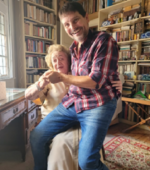 Although they may not know it, Nilda took us on her lap to protect and promote us.. His academic mark is indelible in my career and his departure is a loss that leaves an empty space., an absence that will be very difficult for me to face.
Although they may not know it, Nilda took us on her lap to protect and promote us.. His academic mark is indelible in my career and his departure is a loss that leaves an empty space., an absence that will be very difficult for me to face.
